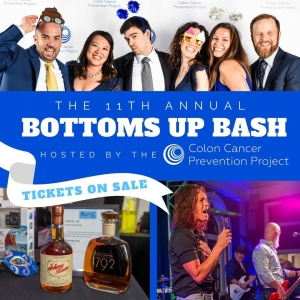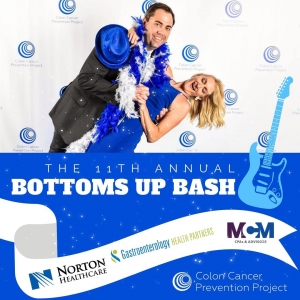2022 Bottoms Up Bash
Gastro Health Partners is proud to sponsor the 11th Annual Bottoms Up Bash! This exceptional event, put on by the Colon Cancer Prevention Project, is a celebration of progress in the fight against colon cancer and an opportunity to raise crucial funds for ending preventable colon cancer death and suffering in Southern Indiana and Kentucky.
What is the Colon Cancer Prevention Project?
Here’s some more information about the CCPP’s mission and work:
“The Colon Cancer Prevention Project founded in 2003 by Dr. Whitney Jones, a Louisville gastroenterologist with a passion for preventing colon cancer. Dr. Jones began the organization after diagnosing several patients with colon cancer within one week. Sick and tired of diagnosing patients with cancer that could have been prevented, he set out to make a change.
The Project began as a small grassroots organization with a large mission of eliminating preventable colon cancer death and suffering. It quickly grew to include work across Kentucky, Indiana, and the country. Before the Project, only 1 in 3 Kentuckians were getting life-saving colon cancer screenings. Now, about 2 in 3 Kentuckians are getting screened, and the incidence rate is down more than 25 percent. Kentucky is now nationally renowned for its work, which includes a state-wide screening program for low-income, uninsured people.
We are committed to educating our communities younger about the power they have to prevent colon cancer. The United States Preventative Services Task Force now recommends average-risk people begin screening at age 45 and those with a family history should screen at 40 or younger. With the help of partners across the state and WKYT, the Project is launching first-of-its-kind digital outreach campaigns to educate & empower our communities to get screened by reaching them on their phones and devices.
We continue to work to make screening more accessible to those who are uninsured and underinsured in our community by promoting free screening resources available through Kentucky Cancer Link, Kentucky Cancer Program, and the Kentucky Colon Cancer Screening and Prevention Program.”
The Bash is Back!
The 2022 Bottoms Up Bash will feature dinner, drinks, dancing, live music by the Crashers, and a silent auction. The event is on March 4, or Dress in Blue Day, and guests are encouraged to dress in their brightest blue to help kick off Colon Cancer Awareness Month. (Note: Event is ages 21+).
“All funds raised will go towards ending colon cancer death and suffering in Kentucky and Southern Indiana. We can’t wait to see you there!”
Learn more about this great event and buy tickets here: https://coloncancerpreventionproject.org/events/bottoms-up-bash-2021/
Gastroenterology Health Partners (GHP) is the largest independent Gastroenterology practice in the region providing care to children, teenagers, and adults across Louisville and Lexington, Kentucky, Southern Indiana, and surrounding communities. GHP has officially endorsed the Digestive Health Partners Association’s message that men and women between the ages of 45 and 75 should be screened for colorectal cancer. This endorsement is backed by the American Cancer Society which also recommends that individuals at average-risk of contracting colorectal cancer begin screenings at the age of 45.
Our experienced team at GHP has years of experience performing colonoscopies and other colorectal cancer screenings. We can help establish the best plan of care for your situation. Contact any of our office locations to learn about the options we offer and schedule an appointment today.





